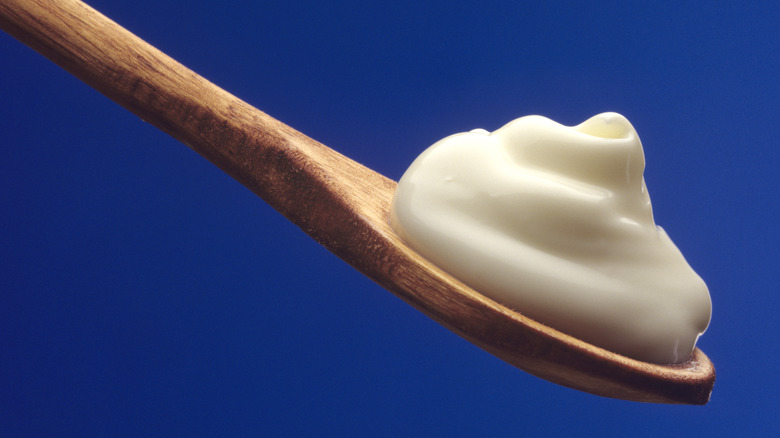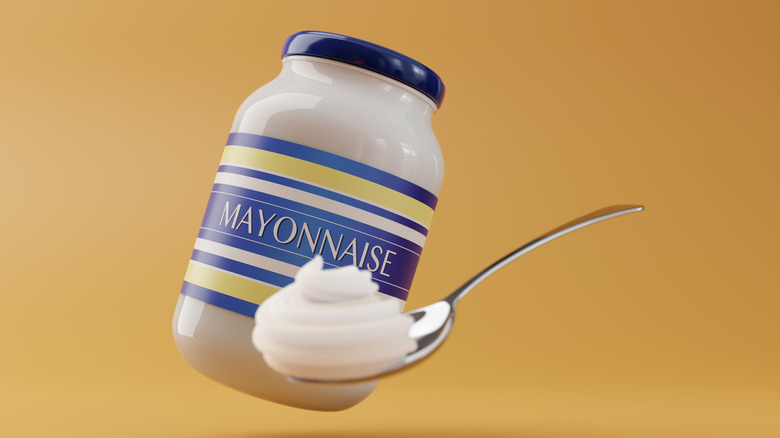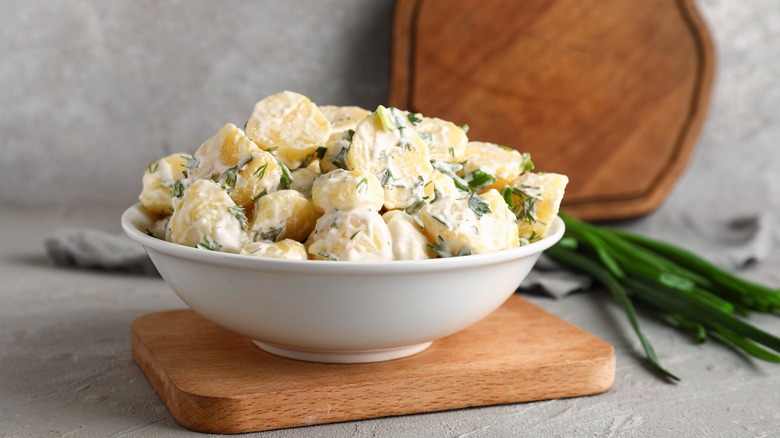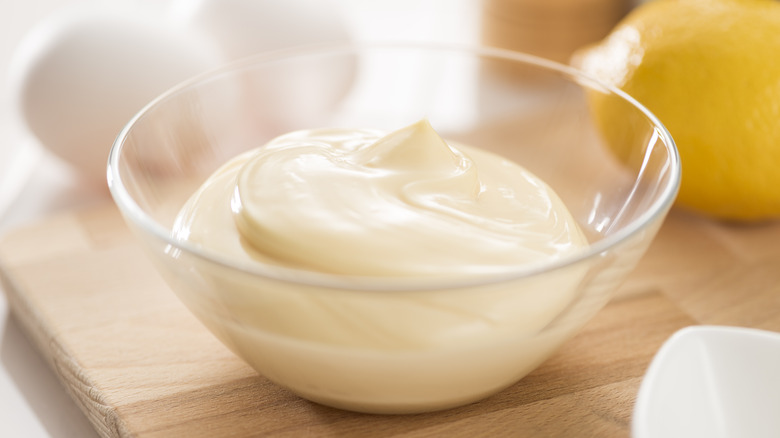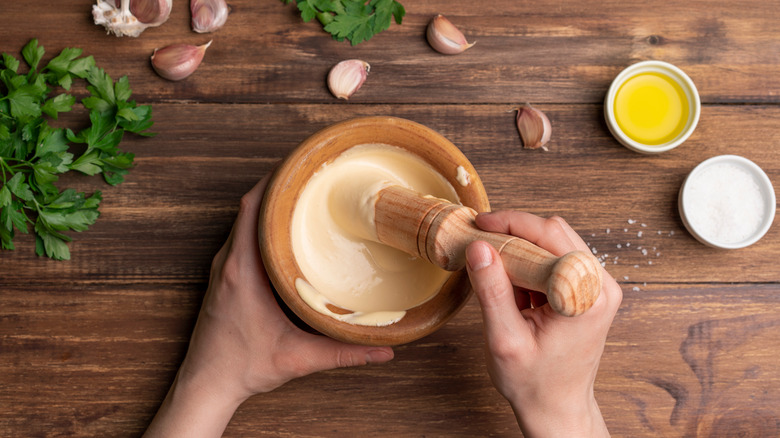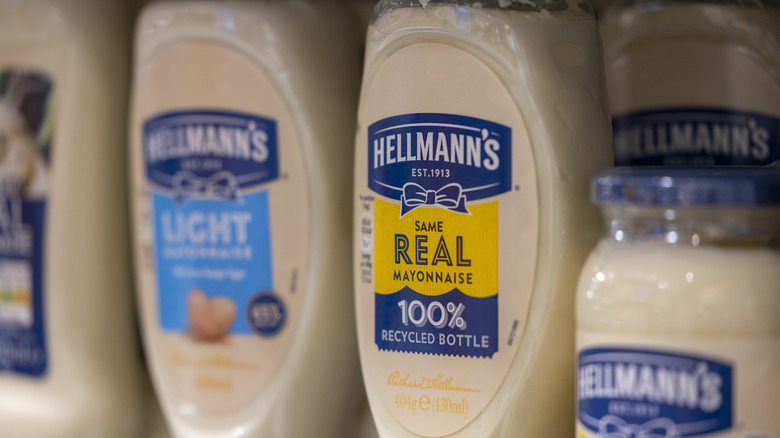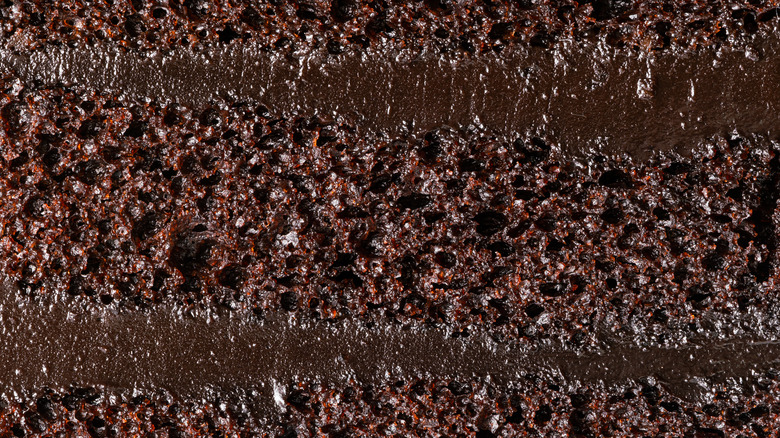False Facts About Mayonnaise You Thought Were True
Mayonnaise is nothing if not a divisive condiment. How many of us have friends who claim to abhor the creamy white condiment, eschewing any sandwich or salad on which it appears?
There may be no changing the minds of these mayo-phobes. For that matter, there may be no swaying the greatest mayo fans, like those who fly the team Duke's flag over that of team Hellmann's. And never mind those who have adopted Japanese Kewpie mayonnaise, with its slightly sweet, definitively egg flavor, and refuse to return to the mayo of their youth. Whichever camp you're in — and whether you like mayo or not — there are a few false facts about mayonnaise you'd do well to reconsider.
From concerns over mayonnaise's safety to claims about its beautifying powers to its purported invention by the Spaniards (or was it the French?), there are numerous myths and legends you might believe about mayo. But it's time to set the story straight. Here are the mayo myths it's time to 86 once and for all.
Myth: Mayo haters have no idea what they're talking about
There are few foods, except perhaps cilantro, that have proven to be quite as divisive as mayonnaise. Those who hate mayonnaise often react with such revulsion that even the mayo-ambivalent could be led to believe the severity of their reaction is a mere put-on.
But, according to experts, there may be a biological reason why mayo haters are so vehement in their revulsion. Paul Rozin, professor of psychology at the University of Pennsylvania and a disgust expert (yep, it's a thing), told Bustle that the feeling so perfectly played by Mindy Kaling in "Inside Out" actually evolved as a defense mechanism to help us keep from eating contaminated or rotten foods. When soft, slimy things occur in nature, it's often a sign that they are decayed or rotten. So, it's no surprise that sliminess, according to one 2006 study published in Appetite, is one of the chief reasons people reject a given food. Since mayo certainly is slimy, it's no surprise so many people are opposed to putting it on their BLT.
Myth: Mayonnaise is a dairy product
Seeing as mayonnaise boasts such a creamy texture (to the point where it's sometimes found in the dairy aisle), it would be tempting to assume that it's a dairy product. But unlike other creamy condiments such as crème fraiche, sour cream, or cream cheese, mayo is dairy-free, making it totally safe for the lactose intolerant to consume. Its texture comes from a combination of eggs, oil, and acid, which are bound together in a smooth emulsification. The lecithin present in egg yolk serves as an emulsifier, forcing the oil to bind with water and lending a creamy texture to the finished product.
Of course, just because it's dairy-free doesn't mean that mayo is vegan. Since traditional mayonnaise is bound with eggs, most plant-based dieters eschew the condiment — or at least they did until recently. Egg-free mayonnaises have become more popular of late, relying instead on pea protein or potato starch to provide the perfect texture.
Myth: Mayo needs to be kept in the fridge
Fears over mayonnaise's tendency to spoil have often led home cooks and restaurants alike to store it in the fridge. However, more recently, experts have shared that this is largely unnecessary when it comes to commercially-produced mayonnaises, which boast a high enough acidity to make this precaution unnecessary. Acid is a natural preservative, and the presence of lemon juice or vinegar in mayonnaise makes it fairly safe to keep at room temperature.
But while this news might have some folks clamoring to use the fridge real estate spent on mayo with something else, a word of caution: While mayo is unlikely to spoil when kept at room temperature, storing it in the fridge does indeed extend its shelf life. The takeaway? Keep your mayo in the fridge, but if you forget to put it away overnight, don't sweat it.
That said, all of this is only the case if you're enjoying store-bought mayonnaise. If you make your mayonnaise from scratch, then you'll definitely want to keep it chilled. Homemade mayonnaise is often made with raw eggs (though you can use a pasteurized variety if you want to be extra cautious). If that homemade mayo isn't treated with care, including refrigeration, it could lead to salmonella poisoning.
Myth: Using mayo in salads will make you sick
Perhaps the most pervasive myth regarding mayonnaise is the fact that its presence in potluck classics like potato salad or chicken salad could prove deadly. Yet, while its acidity does help to keep mayo from turning at room temperature, and we might think that the same holds for mayo-based salads, the reality is more complicated.
While mayonnaise alone is fairly safe at room temperature, experts contend that our fears of too-warm pasta or tuna salad are well-founded. Where we err is in blaming mayo for the danger. Combining mayonnaise with ingredients like meat or vegetables changes the sauce's acidity, thereby fostering an environment where bacteria can grow. One 1982 study published in the Journal of Food Protection even showed that mayonnaise could actually extend the shelf life of meat-based salads, slowing the growth of Staphylococcus aureus and Salmonella typhimurium over time.
The long and short of it, then, is that it's best to keep any mayo-based salads chilled for as long as possible. Don't eat any mayo-based salad that's been sitting out at temperatures over 41 degrees for longer than two hours. Follow those major rules, and you should be in the clear.
Myth: You can't make mayonnaise when you're on your period
If you didn't grow up in France or Madagascar, you may never have heard the myth that it's impossible to make mayonnaise on your period. This legend claims that menstruating women who even attempt to make mayonnaise from scratch will merely cause the sauce to curdle.
Of course, this myth is far from true. Menstruation has long been linked to all sorts of powers, curses, and legends, and many of them pertain to the preparation of foods. Menstruating is framed, in this context, as "dirty," and those who handle food on their periods ostensibly contribute to its spoilage.
It's perhaps no surprise that egg preparations are often evoked in myths relating to menstruation, given its link to ovulation. Some, for example, claim that one shouldn't eat eggs during one's period. But, much like the idea that mayo will curdle if you make it while you're menstruating, is patently untrue.
Myth: Aioli is just fancy mayonnaise
Aioli is seemingly everywhere you look these days, from fancy burger toppings to fancy French fry dipping sauces (with emphasis on fancy). While many sauces that purport to be aiolis would have you believe that this sauce is just a bougie mayonnaise, the reality is far from the case.
Traditional Provençal or Spanish aioli is a combination of garlic and oil and little more. The most basic of aiolis begins with a heckuva lot of garlic, which is typically crushed to a fine paste in a mortar and pestle with some help from a pinch of salt. A touch of lemon juice and the oil of your choice are then emulsified into this mixture ... and that's all she wrote.
While there is certainly the option to capitalize on the emulsifying properties of egg yolks to help your aioli bind, eggs are not the main ingredient in aioli. Some recipes eschew them entirely, calling for moistened bread as a binder, while others just use garlic, oil, and a lot of elbow grease. But one thing's for sure: Just seasoning mayonnaise with garlic or spices and calling it aioli is not a true interpretation of this classic sauce.
Myth: Mayo can soften your hair
Using kitchen ingredients as beauty products has long been a factor in the natural beauty world, but while coffee, for example, can potentially make your hair darker and promote faster growth, and coconut oil makes for a wonderful moisturizer, using store-bought mayonnaise on your hair will do little more than make you smell like potato salad — at least if you're using the store-bought stuff. The added preservatives in store-bought mayonnaise make it far from a cleaner alternative to a traditional hair mask.
That said, some of the ingredients in mayonnaise can promote healthier hair, like olive oil, which some say has a moisturizing effect on hair, or protein-rich eggs, which is a popular hair treatment among natural beauty mavens. However, neither claim has been definitively proven via scientific research or peer-reviewed studies. And if you eat the eggs instead of rubbing them onto your scalp, you'll be more certain to reap the benefits of the protein, B vitamins, and folate that may give you even more luxurious locks.
Myth: Mayonnaise is bad for you
Given its higher fat content, mayonnaise has long been vilified as an unhealthy condiment, especially as compared to lower-fat ketchup or mustard. But the rise of low-carb, high-fat diets like keto and the vilification of the added sugar present in ketchup should have us giving mayo a second look. Mayonnaise is rich in vitamin E and vitamin K, and when made with olive oil or avocado oil, it's also rich in omega-3 fatty acids, which have been linked to improved heart health, lowered inflammation, and more.
That said, most store-bought mayonnaises instead rely on canola or soy oil, the latter of which is typically highly processed and richer in omega-6 fatty acids, which most Americans already get too many of as compared to heart-healthy omega-3s. Don't be tempted to pick the low-fat mayo instead. Since mayo is mostly fat, lowering the fat content requires the addition of other ingredients like starches and sugars to achieve the same texture.
For the healthiest mayo, it can be better to opt for one made with olive or avocado oil. Or you can make your own, opting for the best-quality pasteurized eggs and your heart-healthy oil of choice.
Myth: Mayonnaise was invented by a French chef in the 18th century
The culinary world is rife with origin stories purporting to be fact-based, like the idea that chocolate chip cookies were invented by accident when baker Ruth Wakefield ran out of nuts or chocolate. Mayonnaise has a similar origin myth that is just as tough to prove.
Perhaps the most frequently cited version of the story attributes mayo's invention to the chef serving the Duke of Richelieu, who ostensibly invented the sauce in 1756 when French forces besieged the Spanish-held Port Mahon on the Mediterranean island of Minorca. The chef, realizing he didn't have enough cream for a dish he wanted to prepare, invented the emulsion and dubbed it sauce mahonnaise in reference to the port. A different version of the story says the chef learned the recipe from the locals, while another claims it was invented in Bayonne and was originally called sauce bahonnaise. However, neither story has definitive proof to back it up, so the truth of mayonnaise's origins remains unknown.
Myth: Mayonnaise cake was invented by Hellmann's
Many a time-tested family recipe revolves around the presence of a secret ingredient, and when it comes to cake, the secret is often mayonnaise. After all, mayonnaise contains two of the key ingredients in cake — egg and oil — and using it instead of the ingredients on their own helps the fat coat the flour more evenly, resulting in a moister cake. But while mayo giant Hellmann's would love for you to believe the recipe got its start thanks to Mrs. Price, the wife of a Hellmann's sales distributor, the truth is that the recipe predates that story by quite a bit.
Mayo was originally used to add moisture to cakes in times of austerity when eggs and dairy were harder to come by. The very first printed recipe for such a cake appeared in the Oakland Tribune in 1927, while Mrs. Price's recipe first appeared in a Best Foods booklet printed 10 years later. The trick wouldn't truly skyrocket to popularity until World War II rationing led home cooks to capitalize on the shelf-stable condiment as a key dessert ingredient. These days, it's beloved by experts who claim that not only does mayonnaise keep cakes beautifully moist, but that it can help a cake stay fresher for longer.
